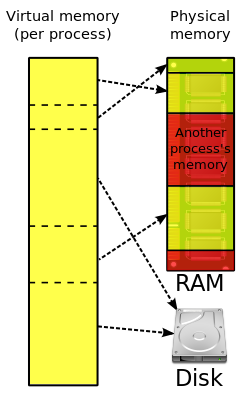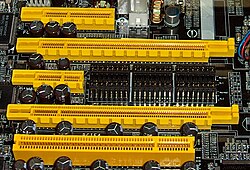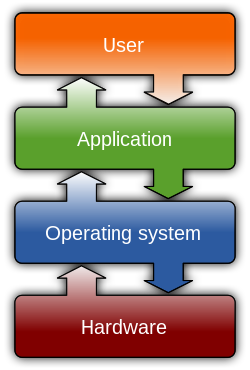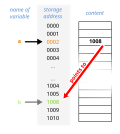computing, a memory address is a reference to a specific memory location in memory used by both software and hardware. These addresses are fixed-length...
18 KB (2,257 words) - 20:42, 30 May 2025
their own instructions. Memory-mapped I/O uses the same address space to address both main memory and I/O devices. The memory and registers of the I/O...
17 KB (2,288 words) - 01:44, 18 November 2024
Content-addressable memory (CAM) is a special type of computer memory used in certain very-high-speed searching applications. It is also known as associative...
14 KB (1,603 words) - 21:01, 25 May 2025
using segmentation, computer memory addresses consist of a segment id and an offset within the segment. A hardware memory management unit (MMU) is responsible...
19 KB (2,337 words) - 16:57, 21 June 2025
virtual address spaces and the assignment of real memory to virtual memory. Address translation hardware in the CPU, often referred to as a memory management...
43 KB (5,336 words) - 13:44, 5 June 2025
In a computer, the memory address register (MAR) is the CPU register that either stores the memory address from which data will be fetched to the CPU...
2 KB (206 words) - 21:26, 20 December 2024
virtual memory operating systems. When a new application on a 32-bit OS is executed, the process has a 4 GiB VAS: each one of the memory addresses (from...
7 KB (739 words) - 00:25, 12 May 2025
Dealing with larger addresses and more memory was thus comparably slower, as that capability was somewhat grafted-on in the Intel 8086. Memory segmentation could...
23 KB (3,302 words) - 06:46, 10 June 2025
Instruction cycle (section Memory address register)
register that holds the memory address of the next instruction to be executed. After each instruction copy to the memory address register (MAR), the PC...
10 KB (1,255 words) - 07:48, 24 April 2025
Real mode (redirect from Real-address mode)
real locations in memory. Real mode is characterized by a 20-bit segmented memory address space (giving 1 MB of addressable memory) and unlimited direct...
10 KB (1,508 words) - 10:08, 25 June 2024
references to memory, and translates the memory addresses being referenced, known as virtual memory addresses, into physical addresses in main memory. In modern...
49 KB (7,099 words) - 18:50, 8 May 2025
Bus (computing) (redirect from Address bus)
of memory a system can address. For example, a system with a 32-bit address bus can address 232 (4,294,967,296) memory locations. If each memory location...
31 KB (3,942 words) - 21:58, 20 June 2025
effectiveness of memory management. Virtual memory systems separate the memory addresses used by a process from actual physical addresses, allowing separation...
26 KB (3,004 words) - 04:20, 2 June 2025
the operand(s) of each instruction. An addressing mode specifies how to calculate the effective memory address of an operand by using information held...
48 KB (6,132 words) - 15:32, 22 June 2025
can be accessed by a binary address of N bits, making it possible to store 2N words in the memory. In the early 1940s, memory technology often permitted...
29 KB (3,284 words) - 03:27, 21 June 2025
termination of the offending process. Memory protection for computer security includes additional techniques such as address space layout randomization and executable-space...
18 KB (2,268 words) - 16:46, 24 January 2025
of the value in the memory location specified by the memory address register. It acts as a buffer, allowing the processor and memory units to act independently...
3 KB (354 words) - 15:40, 20 June 2025
In computing, a logical address is the address at which an item (memory cell, storage element, network host) appears to reside from the perspective of...
4 KB (418 words) - 18:36, 29 July 2024
an address space defines a range of discrete addresses, each of which may correspond to a network host, peripheral device, disk sector, a memory cell...
5 KB (616 words) - 19:19, 23 May 2025
Program counter (redirect from Instruction address register)
the memory address of ("points to") the next instruction that would be executed. Processors usually fetch instructions sequentially from memory, but...
12 KB (1,382 words) - 23:43, 21 June 2025
counter (instruction address); program instructions specified only the address of the data in memory. A word in the computer's memory could be read, written...
37 KB (4,034 words) - 20:27, 21 June 2025
languages that stores a memory address. This can be that of another value located in computer memory, or in some cases, that of memory-mapped computer hardware...
72 KB (9,678 words) - 04:54, 20 March 2025
memory-to-memory operation, the host processor initializes the DMA controller with a count of the number of words to transfer, and the memory address...
28 KB (3,934 words) - 17:12, 29 May 2025
virtual addresses to physical addresses, the IOMMU maps device-visible virtual addresses (also called device addresses or memory mapped I/O addresses in this...
12 KB (1,307 words) - 00:46, 15 February 2025
Dynamic random-access memory (dynamic RAM or DRAM) is a type of random-access semiconductor memory that stores each bit of data in a memory cell, usually consisting...
92 KB (11,072 words) - 15:56, 20 June 2025
Computer data storage (redirect from Location-addressable storage)
through an address bus, a number called memory address, that indicates the desired location of data. Then it reads or writes the data in the memory cells using...
57 KB (6,541 words) - 01:42, 18 June 2025
physical address (also real address, or binary address), is a memory address that is represented in the form of a binary number on the address bus circuitry...
4 KB (414 words) - 19:40, 5 January 2025
translation of logical addresses to physical addresses. As such, paged memory functionality is usually hardwired into a CPU through its Memory Management Unit...
43 KB (5,453 words) - 17:18, 20 May 2025
64-bit computing (section 64-bit address timeline)
In computer architecture, 64-bit integers, memory addresses, or other data units are those that are 64 bits wide. Also, 64-bit central processing units...
59 KB (7,325 words) - 19:49, 21 June 2025
Translation lookaside buffer (redirect from Address Translation Registers)
lookaside buffer (TLB) is a memory cache that stores the recent translations of virtual memory address to a physical memory location. It is used to reduce...
25 KB (3,339 words) - 23:39, 2 June 2025
















